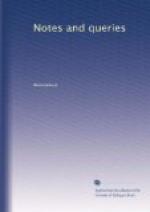Gratefulness:
“Thou, that hast given so much
to me,
Give one thing more, a grateful heart.”
Cf. Second Pt. Henry Sixth, I. i.:
“O Lord, that lends me life,
Lend me a heart replete with thankfulness;
For Thou hast given me, in this beauteous face,
A world of earthly blessings to my soul.”
* * * * *
The Answer:
“All the thoughts and ends
Which my fierce youth did bandy, fall and flow
Like leaves about me, or like summer friends,
Flies of estate and sunshine.”
Cf. Troil. and Cressida, III. S.:
“Men, like butterflies,
Show not their mealy wings but to the summer;
And not a man, for being simply man,
Hath any honour.”
Also, Third Pt. Henry Sixth, II. 6.:
“The common people swarm like summer
flies,
And whither fly the gnats, but to the
sun?
And who shines now, but Henry’s
enemies?”
S.A.Y.
Old Dan Tucker.—In a little book entitled A Thousand Facts in the Histories of Devon and Cornwall, p. 50., occurs the following passage:
“The first governor
[of Bermuda] was a Mr. Moore, who was
succeeded by Captain Daniel
Tucker.”
Does this throw any light on the popular negro song—
“Out o’ de way, old Dan Tucker,” &c.?
H.G.T.
Lord John Townsend.—I have a copy of the Rolliad, with the names of most of the contributors, taken from a copy belonging to Dr. Lawrence, the editor of the volume, and author of many of the articles. In the margin of “Jekyll,” lines 73. to 100. are stated to be “inserted by Tickle;” and lines 156. to the end, as “altered and enlarged by Tickle:” and at the end is the following note:—
“There are two or three other lines in different parts of the foregoing eclogue, which were altered, or inserted by Tickle—chiefly in the connecting parts. The first draft (which was wholly Lord John Townsend’s) was a closer parody of Virgil’s 18th eclogue; especially in the beginning and conclusion, in the latter of which only Jekyll was introduced as ‘the poet.’
“Tickle changed the plan, and made it what it is. The title (as indeed the principal subject of the eclogue) was in consequence altered from ‘Lansdown’ to ‘Jekyll.’ The poetry and satire are certainly enriched by Tickle’s touches; but I question whether the humour was not more terse and classical, and the subject more just, as the poem originally stood.”—L.
Probationary Odes No. XII. is by “Lord John Townsend.”
“Three or four lines
in the last stanza, and perhaps one or two
in some of the former, were
inserted by Tickle.”—L.




